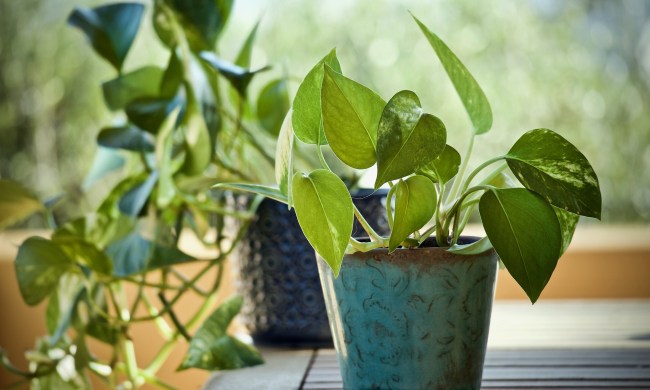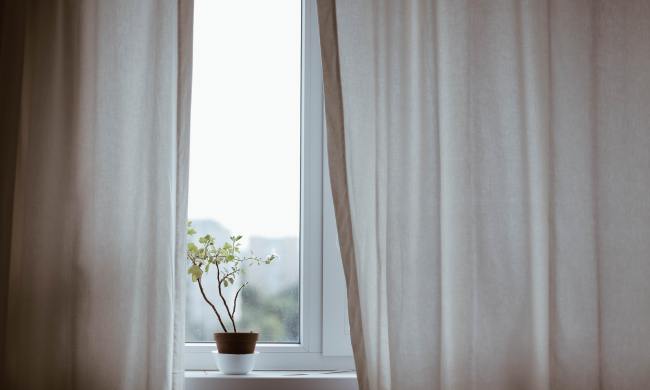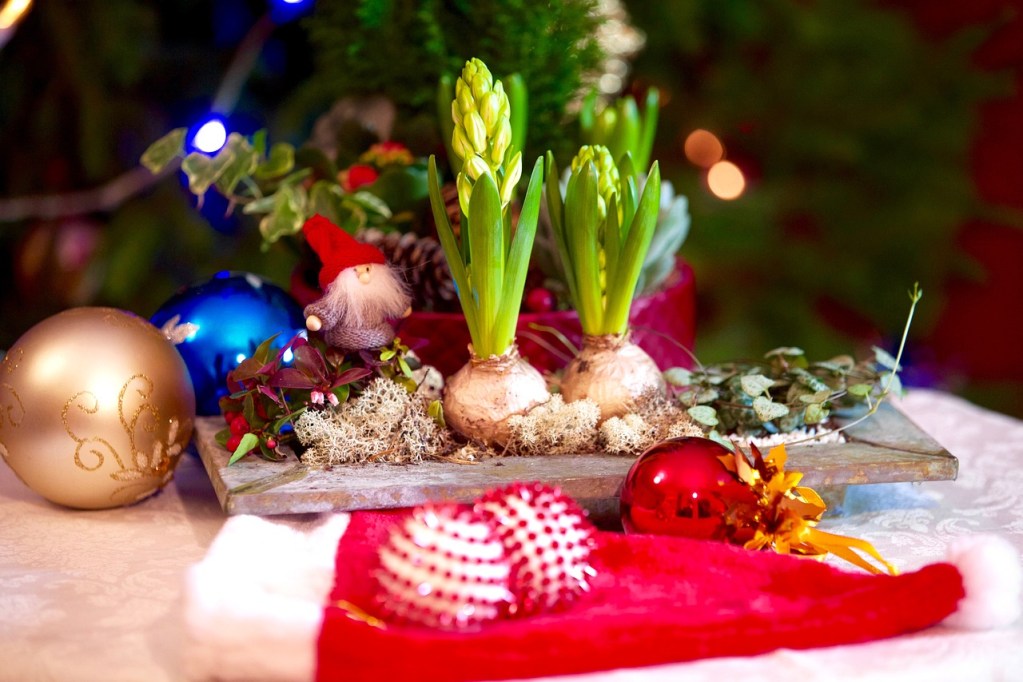
As you decorate for the holidays, don’t forget your plants! Incorporating your houseplants into your holiday celebrations and decor is a great way to brighten up your home. Christmas may be one of the most common holidays for decorations, so don’t forget that plants can be useful for other holiday festivities as well. No matter what you’re celebrating this winter season, this guide has something for everyone! For tips on how to make your plants festive for the holiday season, follow this simple guide to houseplant holiday decorations.
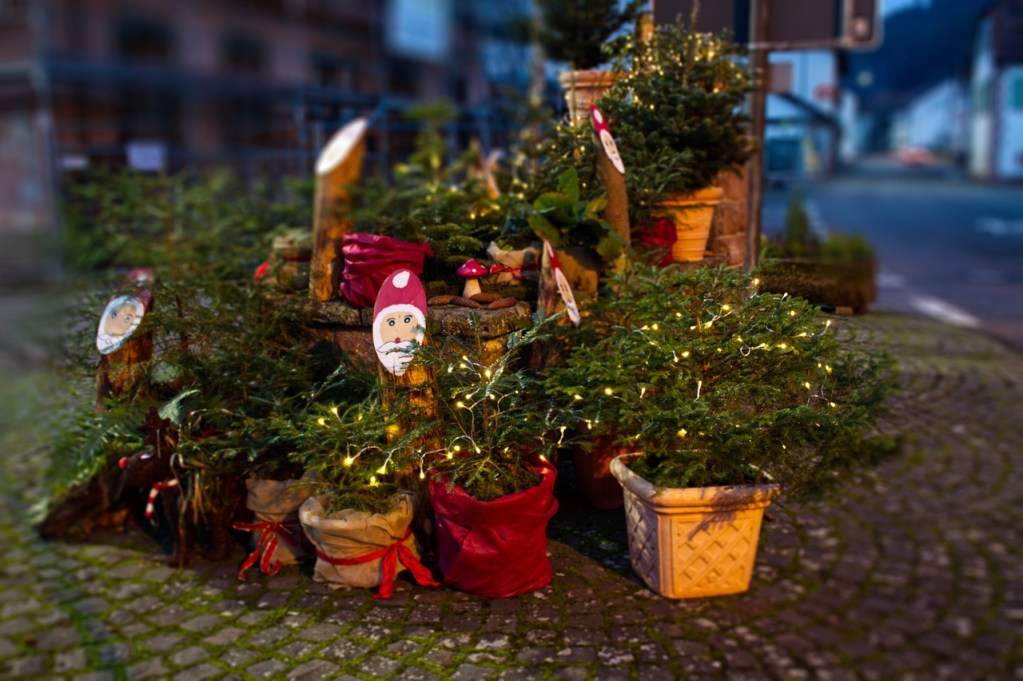
Add ornaments and lights to your houseplants
Here’s a simple holiday plant idea: Furnish your houseplants with ornaments, tinsel, and string lights. If you’re doing this in lieu of a Christmas tree, it’ll very likely be much cheaper than furnishing a 6-foot-tall tree, as you can buy most of the mini decorations at your local dollar store! Money trees, corn plants, and rubber trees are just a few houseplants with strong central stems that can handle minor weight from lights and ornaments. If you want to avoid placing anything onto your plants, create holiday stakes with cut-out Santas, snowflakes, ornaments, and more.
Actual tree plants, such as lemon cyprus, also work perfectly since they look like mini Christmas trees. They’re usually around 3 feet tall, so they’ll give you that Christmas feel without breaking your budget or burdening you with an extensive cleanup after the holidays.

Use decorative mugs as planters
Along with bells, whistles, and ornaments, the holiday season also usually comes with new mugs in stores for everyone who wants to infuse festive cheer in a cup. If you have a holiday mug that you’re not getting much use out of or one with minor cracks, upcycle it as a planter. You can drill a hole directly into your mug, but using it as a cover pot is definitely easier — a large one can easily accommodate a 2 or 3-inch nursery planter. If you use it as a cover pot, you can even switch your plant between different mugs for different holidays or occasions!
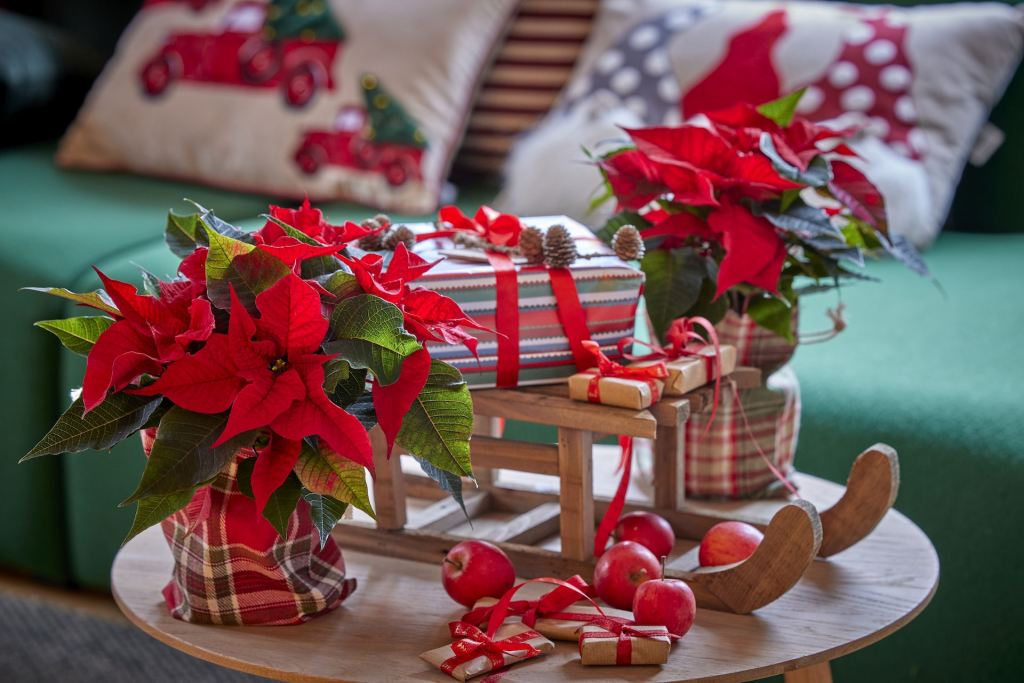
Wrap ribbons around your plants
It really doesn’t get any easier than wrapping ribbons around your planters or branches for easy houseplant holiday decorations. For your ribbon, choose colors such as red, green, silver, and gold to give your plant Christmas vibes. Of course, holiday-specific and tartan patterns also work beautifully. For an even more low-maintenance project, stick a shiny adhesive bow onto your planter — you’ll likely have these around for wrapping presents, anyway! Another fun tip: Cover your planter in actual wrapping paper, then place an adhesive bow onto it.
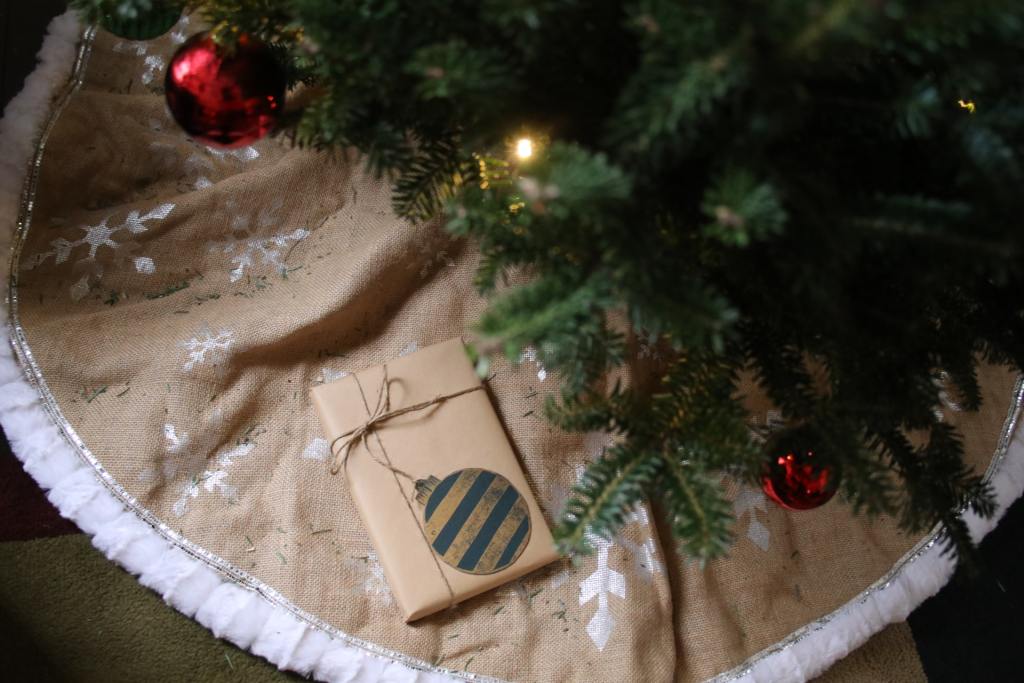
Add Christmas skirts to your planters
If you have a plant sitting in a pot that’s at least 12 inches, you can definitely place a Christmas skirt beneath it to get that holiday vibe. Velvety, embroidered skirts are easy to source during the holidays in any home goods store or online. If you want to create one that’s more custom to the planter that you have, you can also get crafty. Pick out a fabric to your liking (burgundy and white make for classic Christmas skirts), cut and seam along the outside, then iron on holiday-themed embroidered patches. While these are classically associated with Christmas trees, you can also choose fabrics patterned or themed around different holidays, seasons, or aesthetics.

Place trailing plants on your mantle
Alongside your poinsettias and paperwhites, place a trailing plant on your mantle. Plants such as ivy, pothos, and philodendron can add a cozy, rustic feel to any space. They look especially inviting at the base of candle holders (just keep them away from flames!). You can attach ornaments to stems and nodes for a festive look as well — just make sure that your planter is heavy enough or securely attached to the mantle so that it doesn’t tip over.
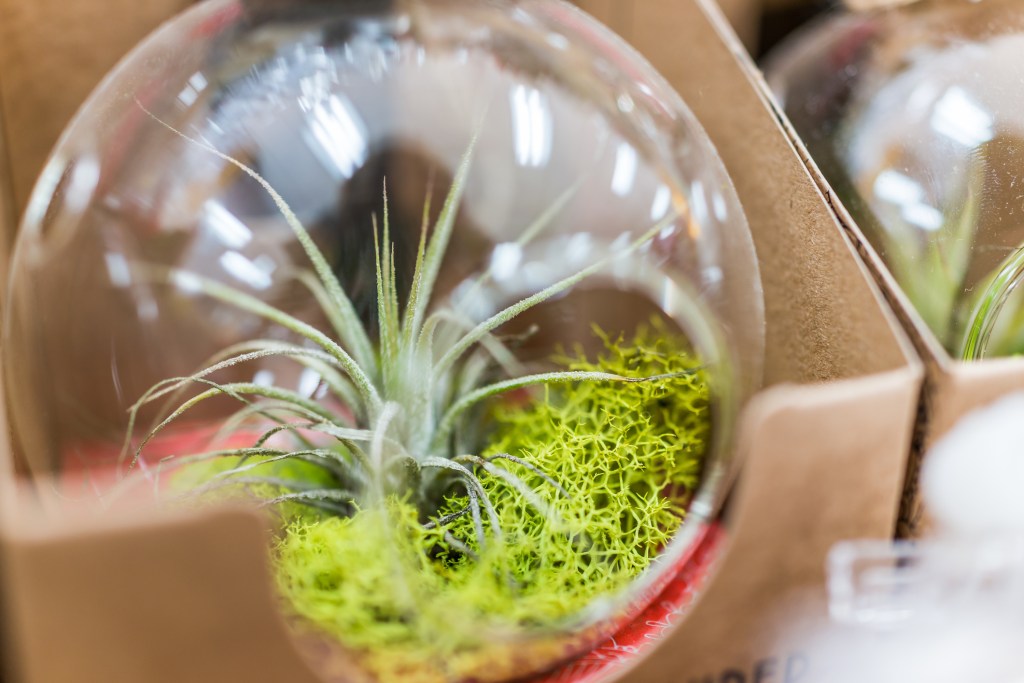
Make terrarium ornaments
Why not furnish your Christmas tree with even more plants? Grab sets of plastic or glass terrarium ornaments online or from a local craft store come the holidays. You can stick in an air plant to keep things simple. Alternatively, you can go all out with a soil base and mini plant cuttings. If space allows, add mini ornaments, gnomes, and other holiday-themed tchotchkes as well.
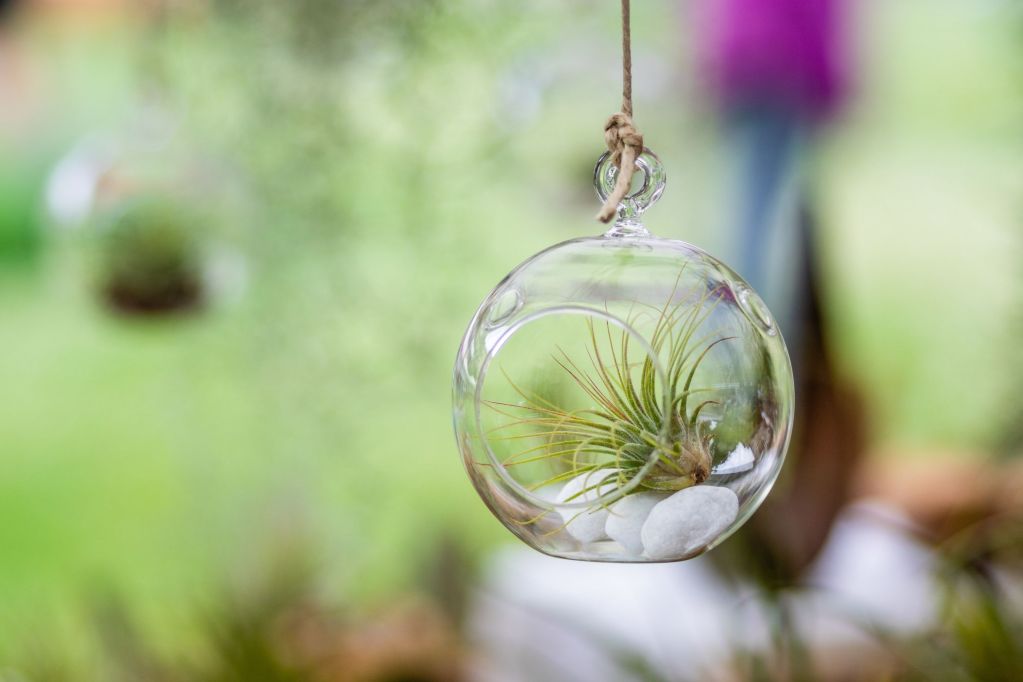
Mount your air plants onto a wreath
Air plants are extremely easy to care for in addition to coming in interesting shapes and colors for a vibrant wreath setup. Secure these low-maintenance beauties to a plain wreath with floral wire and add creative touches with ornaments, fake holly, pine cones, and more. Every so often, spritz your air plants as you would if they weren’t on the wreath.
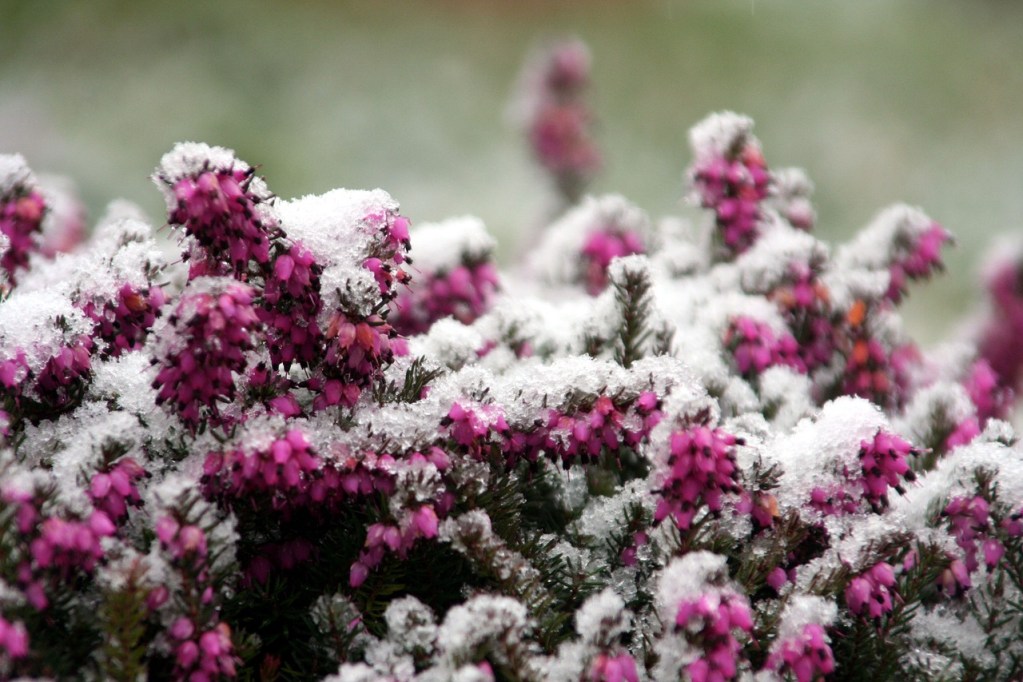
Dust your plants with fake snow
Real snow is cold, and wet and can damage your sensitive indoor plants, but it certainly looks beautiful! Capture that seasonal wonder with fake snow for your indoor plants. Most fake snow is generally safe for plants, but that doesn’t mean that every plant loves it. Here are a few things to keep in mind when using fake snow.
Fake snow gels or powders that are mixed with water can dampen the leaves of your plant. Avoid using these on plants that don’t enjoy wet leaves, such as cacti and succulents. Using a dry substitute like instant mashed potatoes is a good alternative, but keep in mind that any pets you have may want a taste! Cleaning up afterward can be tricky, but you can make it easier through the use of decorative (and practical!) skirts. A layer of fabric underneath your plant will speed up the clean-up process.
Another layer between your plant’s soil and the fake snow will also help, and it prevents the fake snow from soaking into the soil. If you’re using wet fake snow, remember that both paper and fabric will absorb water. It’s better to use a thin sheet of plastic or tinfoil in that case. You can carefully move the layer and the snow to water your plant, then replace it. Once the holiday season is over, don’t forget to wipe your plant’s leaves down with a cloth!
While houseplants can feel like separate entities from your Christmas decorations, they don’t have to be. It’s easy to incorporate holiday cheer into your home with plants. In some cases, you can skip the tree altogether if you don’t have the space — toss the tinsel, lights, and ornaments onto your favorite houseplant to ring in the holidays!

